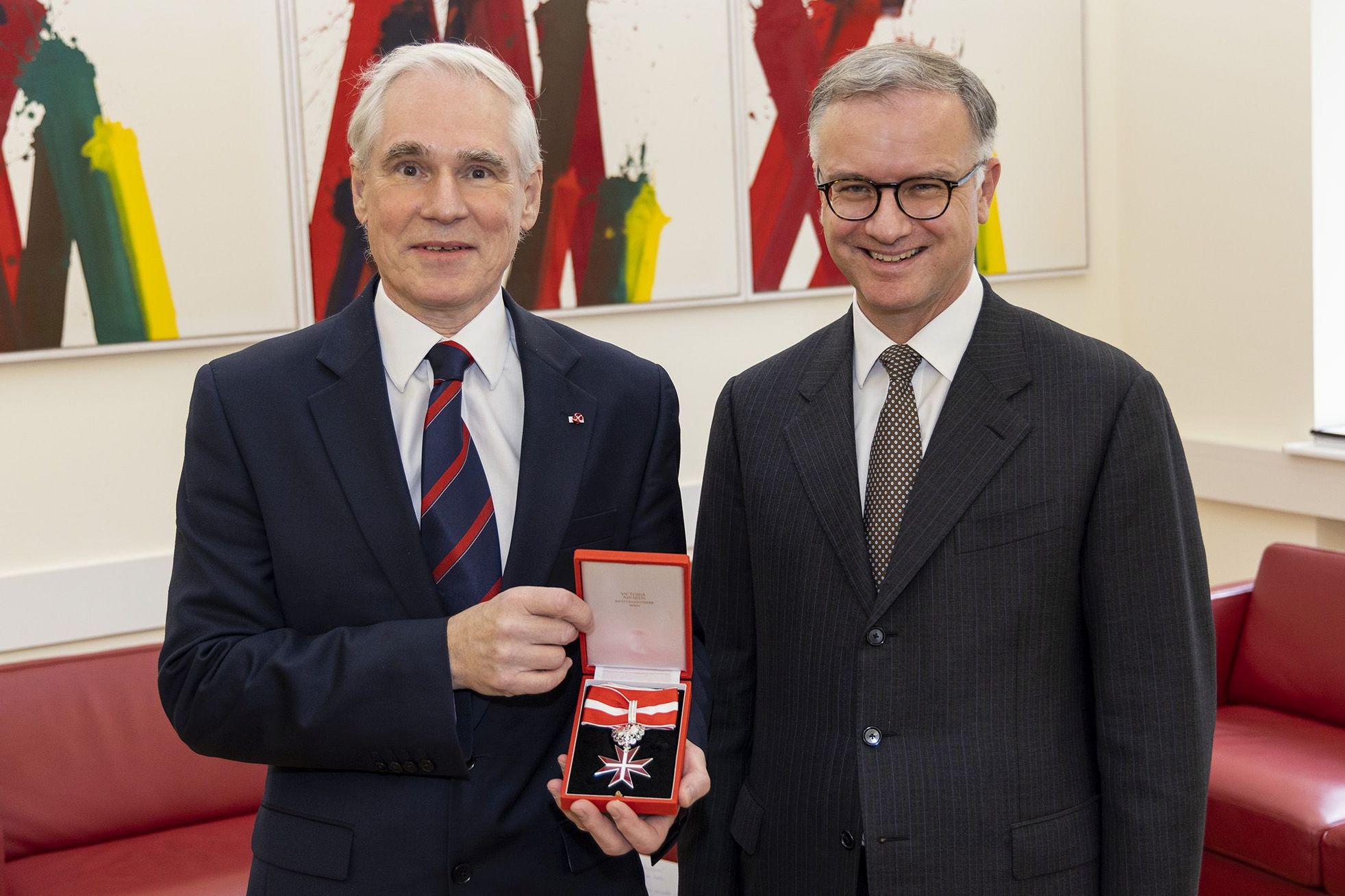
(Vienna, 20 December 2021) Hans-Georg Eichler, Professor of Clinical Pharmacology at MedUni Vienna, has been awarded the Grand Decoration of Honour in Silver for services to the Republic of Austria by Austrian President Van der Bellen. Eichler was recognised for his services to international drug development and approval. The decoration was presented by Rector Markus Müller on behalf of the Austrian President.
Hans-Georg Eichler studied medicine at the Medical Faculty of the University of Vienna and was appointed Professor of Clinical Pharmacology at the University of Vienna in 1992 at the age of 36, making him one of the youngest professors, and took management of the Department of Clinical Pharmacology. One of his major ambitions was to increase the scientific quality of research work. The Department's scientific output increased exponentially but, at the same time, he also focussed on excellence in education. His successful "students" include the Rector of the Medical University of Vienna, the Head of the Ethics Committee Vienna, the current Head of the Department of Clinical Pharmacology, various holders of important scientific positions and some scientific experts within the European Medicines Agency.
From 1995 to 2007, Eichler was also chairman of the Medicines Evaluation Committee (HEK) of the Federation of Social Insurance Agencies. One of his achievements was to change the basis for deciding which medicines would be paid for by the health insurance funds. Evaluation was no longer based on letters of recommendation from a few experts but on data from well-planned and successfully conducted clinical trials ("evidence-based medicine").
"Poor science is unethical science"
In 1996 Eichler also took over as head of the Ethics Committee of the Medical Faculty of the University of Vienna. His principle was "poor science is unethical science" and, in this capacity, he worked hard to improve the scientific quality of research projects. In order to introduce these principles throughout Austria, he founded the Forum of Austrian Ethics Committees in 1997 and succeeded in harmonising the working methods of the Austrian Ethics Committees and defining a scientific standard for clinical research in Austria that was as uniform as possible.
Eichler co-founded the Vienna School of Clinical Research (VSCR) in 2000 and was its president until 2006. The VCSR is a non-profit organisation dedicated to providing clinical research training to doctors and allied health professionals in Central and Eastern Europe and in developing countries. As an independent postgraduate training institution, the VSCR has already taught more than 7,000 doctors and natural scientists from more than 90 countries.
From 2003 to 2007, Eichler was Vice Rector for Research and International Relations at the Medical University of Vienna. In this role as well, his main goal was to raise the quality of research at the Medical University. He was less concerned with the number of publications than with the impact that the Medical University of Vienna's scientific publications have on medical progress throughout the world.
Another goal was to establish the "Vienna Medical School" in East Asia and North Africa, where he was instrumental in building two large hospitals.
Chief Medical Officer of the European Medicines Agency (EMA)
In 2007, Eichler became the first Austrian to be appointed Chief Medical Officer of the European Medicines Agency (EMA), a position he held until 2021. The EMA is in charge of the scientific evaluation, supervision and safety monitoring of medicinal products in the EU. In this role, two of his main goals were "data transparency" and "improvement of regulatory science".
In October 2016, he succeeded in ensuring that clinical data submitted to the EMA by the pharmaceutical industry for approval of a new drug are publicly available once approval has been granted, thus ensuring the greatest possible data transparency. Due to the rapid development of preclinical drug research, it became necessary to redesign and adapt the clinical studies required for approval of a drug and to develop processes and methods that can serve as a basis for formulating regulatory requirements that ensure the safety and efficacy of medical products, while at the same time making them available to patients as rapidly as possible. He published papers on these subjects in the major international journals and these revolutionised drug approval. Ultimately, it was due to the processes he initiated and helped to develop that COVID vaccines were approved so quickly in Europe, while ensuring the highest possible quality.
Throughout his time at the EMA, he maintained close links with the Medical University of Vienna, as is evidenced by numerous joint publications. Hans-Georg Eichler has managed to bring about a significant improvement in the quality of clinical research for drug development and approval worldwide, in keeping with his dictum, "the right drug for the right patient at the right time".